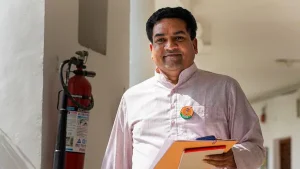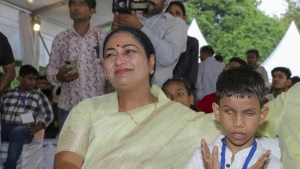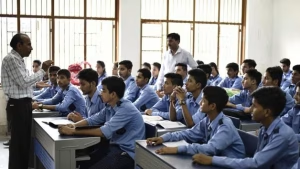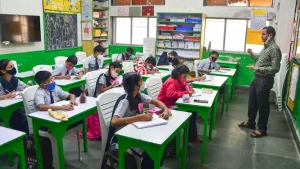New Delhi – Delhi Chief Minister Rekha Gupta has announced a groundbreaking educational reform that will introduce Regional Languages In Delhi Schools as part of a comprehensive cultural integration program. This revolutionary initiative aims to provide students in the national capital with opportunities to learn diverse languages from across India, fostering deeper understanding of the country’s rich linguistic heritage and cultural traditions.
The announcement of Regional Languages In Delhi Schools represents a significant shift in educational policy, reflecting the government’s commitment to promoting India’s linguistic diversity within the formal education system. This initiative is expected to transform how students in Delhi engage with and understand the multicultural fabric of their nation.
Comprehensive Cultural Integration Strategy

During a detailed review meeting at the Delhi Secretariat, CM Gupta outlined her vision for Regional Languages In Delhi Schools alongside Minister Kapil Mishra from the department of art, culture and languages. The initiative forms part of a broader strategy to position Delhi not merely as the political capital but as a true reflection of India’s cultural identity and diversity.
The Regional Languages In Delhi Schools program will be complemented by an innovative student exchange initiative that will allow Delhi students to interact directly with peers from other states. This comprehensive approach ensures that language learning is supported by authentic cultural experiences and real-world applications of linguistic skills.
Educational Philosophy Behind Language Diversity

The chief minister emphasized that Regional Languages In Delhi Schools initiative stems from a fundamental belief that language serves as a gateway to understanding different cultural traditions and lifestyles. By enabling Delhi students to learn languages from various states, the program aims to create more culturally aware and nationally integrated citizens.
Also Read: AAP Councilor Betting Racket Delhi: Shocking Arrest of Joginder Singh With 6 Others
Officials have been instructed to prepare detailed implementation reports for Regional Languages In Delhi Schools, ensuring that the program is structured to effectively promote India’s diverse linguistic landscape. This systematic approach demonstrates the government’s serious commitment to transforming theoretical policy announcements into practical educational outcomes.
Student Exchange Program Enhancement

The Regional Languages In Delhi Schools initiative will be significantly strengthened through the proposed student exchange program that will expose Delhi students to different regional cultures and lifestyles. This experiential learning component ensures that language acquisition is supplemented by direct cultural immersion and authentic interpersonal interactions.
CM Gupta believes that combining Regional Languages In Delhi Schools with student exchange opportunities will create a powerful synergy that significantly strengthens national unity while celebrating diversity. Students will not only learn regional languages but also experience firsthand the cultural contexts in which these languages are naturally spoken.
Cultural Festivals and Community Engagement
The implementation of Regional Languages In Delhi Schools will be supported by expanded cultural programming that brings regional festivals and artistic traditions directly to Delhi’s streets and communities. The government plans to invite artists from respective states to participate in these celebrations, creating authentic cultural experiences that reinforce classroom learning.
This community-centered approach to Regional Languages In Delhi Schools ensures that language learning extends beyond formal educational settings into broader social and cultural contexts. By integrating regional festivals with language education, students will develop more comprehensive understanding of the cultural significance behind different linguistic traditions.
Art and Cultural Preservation Efforts
The Regional Languages In Delhi Schools program operates within a broader framework of cultural preservation and promotion that includes maintaining 75 lesser-known heritage sites alongside nationally important monuments. These historical locations, including Malcha Mahal, Bhuli Bhatiyari Ka Mahal, Ghalib Ki Haveli, Dwarka Baoli, and Kuli Khan’s Tomb, will become more accessible educational resources.
The integration of heritage site visits with Regional Languages In Delhi Schools curriculum will provide students with tangible connections to India’s historical linguistic diversity. These sites serve as living testimonies to the rich multilingual heritage that the current educational initiative seeks to preserve and promote.
Implementation Strategy and Timeline
Department officials are currently developing comprehensive implementation strategies for Regional Languages In Delhi Schools that will ensure systematic rollout across the capital’s educational institutions. The program will begin with pilot projects in select schools before expanding to encompass the entire Delhi education system.
The success of Regional Languages In Delhi Schools will depend on careful planning, adequate resource allocation, and effective teacher training programs. Officials are working to identify qualified language instructors and develop appropriate curriculum materials that reflect authentic regional linguistic and cultural content.
Vision for National Unity Through Education


CM Gupta’s vision for Regional Languages In Delhi Schools extends beyond mere language instruction to encompass broader goals of national integration and cultural understanding. She believes that when students learn regional languages, they develop deeper appreciation for India’s unity in diversity principle.
The Regional Languages In Delhi Schools initiative represents a significant investment in creating more culturally literate citizens who understand that India’s strength lies in its diversity. Through this program, Delhi students will become ambassadors of national unity, equipped with linguistic skills and cultural knowledge that enable them to connect meaningfully with people from all corners of the country.
This transformative educational reform promises to reshape how future generations understand their national identity while celebrating the rich tapestry of languages and cultures that define modern India.

